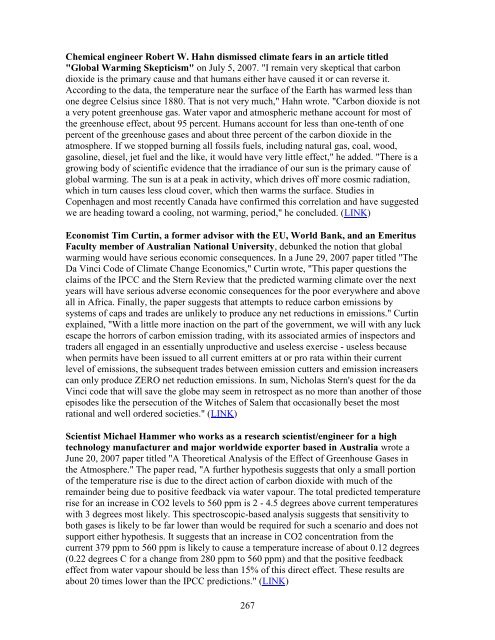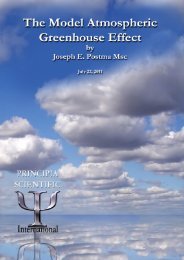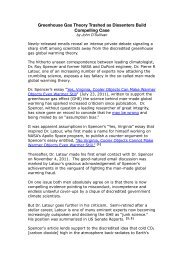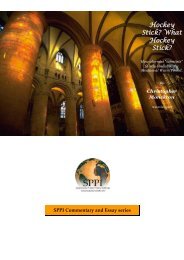Than 1000 International Scientists Dissent Over Man-Made Global ...
Than 1000 International Scientists Dissent Over Man-Made Global ...
Than 1000 International Scientists Dissent Over Man-Made Global ...
You also want an ePaper? Increase the reach of your titles
YUMPU automatically turns print PDFs into web optimized ePapers that Google loves.
Chemical engineer Robert W. Hahn dismissed climate fears in an article titled<br />
"<strong>Global</strong> Warming Skepticism" on July 5, 2007. "I remain very skeptical that carbon<br />
dioxide is the primary cause and that humans either have caused it or can reverse it.<br />
According to the data, the temperature near the surface of the Earth has warmed less than<br />
one degree Celsius since 1880. That is not very much," Hahn wrote. "Carbon dioxide is not<br />
a very potent greenhouse gas. Water vapor and atmospheric methane account for most of<br />
the greenhouse effect, about 95 percent. Humans account for less than one-tenth of one<br />
percent of the greenhouse gases and about three percent of the carbon dioxide in the<br />
atmosphere. If we stopped burning all fossils fuels, including natural gas, coal, wood,<br />
gasoline, diesel, jet fuel and the like, it would have very little effect," he added. "There is a<br />
growing body of scientific evidence that the irradiance of our sun is the primary cause of<br />
global warming. The sun is at a peak in activity, which drives off more cosmic radiation,<br />
which in turn causes less cloud cover, which then warms the surface. Studies in<br />
Copenhagen and most recently Canada have confirmed this correlation and have suggested<br />
we are heading toward a cooling, not warming, period," he concluded. (LINK)<br />
Economist Tim Curtin, a former advisor with the EU, World Bank, and an Emeritus<br />
Faculty member of Australian National University, debunked the notion that global<br />
warming would have serious economic consequences. In a June 29, 2007 paper titled "The<br />
Da Vinci Code of Climate Change Economics," Curtin wrote, "This paper questions the<br />
claims of the IPCC and the Stern Review that the predicted warming climate over the next<br />
years will have serious adverse economic consequences for the poor everywhere and above<br />
all in Africa. Finally, the paper suggests that attempts to reduce carbon emissions by<br />
systems of caps and trades are unlikely to produce any net reductions in emissions." Curtin<br />
explained, "With a little more inaction on the part of the government, we will with any luck<br />
escape the horrors of carbon emission trading, with its associated armies of inspectors and<br />
traders all engaged in an essentially unproductive and useless exercise - useless because<br />
when permits have been issued to all current emitters at or pro rata within their current<br />
level of emissions, the subsequent trades between emission cutters and emission increasers<br />
can only produce ZERO net reduction emissions. In sum, Nicholas Stern's quest for the da<br />
Vinci code that will save the globe may seem in retrospect as no more than another of those<br />
episodes like the persecution of the Witches of Salem that occasionally beset the most<br />
rational and well ordered societies." (LINK)<br />
Scientist Michael Hammer who works as a research scientist/engineer for a high<br />
technology manufacturer and major worldwide exporter based in Australia wrote a<br />
June 20, 2007 paper titled "A Theoretical Analysis of the Effect of Greenhouse Gases in<br />
the Atmosphere." The paper read, "A further hypothesis suggests that only a small portion<br />
of the temperature rise is due to the direct action of carbon dioxide with much of the<br />
remainder being due to positive feedback via water vapour. The total predicted temperature<br />
rise for an increase in CO2 levels to 560 ppm is 2 - 4.5 degrees above current temperatures<br />
with 3 degrees most likely. This spectroscopic-based analysis suggests that sensitivity to<br />
both gases is likely to be far lower than would be required for such a scenario and does not<br />
support either hypothesis. It suggests that an increase in CO2 concentration from the<br />
current 379 ppm to 560 ppm is likely to cause a temperature increase of about 0.12 degrees<br />
(0.22 degrees C for a change from 280 ppm to 560 ppm) and that the positive feedback<br />
effect from water vapour should be less than 15% of this direct effect. These results are<br />
about 20 times lower than the IPCC predictions." (LINK)<br />
267





